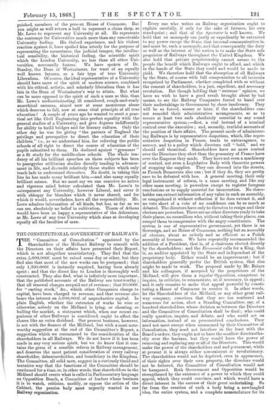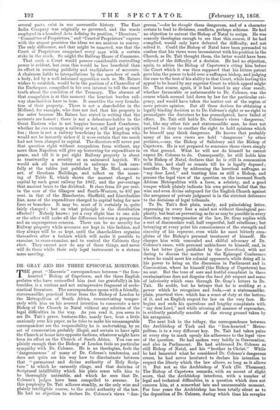THE CONSTITUTIONAL GOVERNMENT OF RAILWAYS.
THE "Committee of Consultation" appointed by the Shareholders of the Midland Railway to consult with the Directors on their affairs have presented their Report, which is not altogether unsatisfactory. They find that the extra 5,000,000/. must be raised some day or other, but they find also that most of the new works can be postponed ; that only 1,300,000/. is instantly required, having been already spent ; and that the direct line to London is thoroughly well constructed. They also find, what is infinitely more important, that the published accounts of the Railway are trustworthy ; that all renewal charges are paid out of revenue ; that 90,000/. for "carting stock," &c., which other Companies charge to capital, have been charged to revenue, and that revenue also bears the interest on 5,000,000/. of unproductive capital. In plain English, whether the extension of works be wise or otherwise, nobody on the Midland is lying, or cheating, or bulling the market, a statement which, when our recent ex- perience of other Railways is considered, ought to affect the shares like an extra dividend. Our present business, however, is not with the finance of the Midland, but with a most note- worthy suggestion at the end of the Committee's Report, a suggestion which we recommend to the consideration of the shareholders in all Railways. We do not know if it has been made in any very serious spirit, but we do know that it con- tains the germ of a sensible reform in Railway management, and deserves the most patient consideration of every railway shareholder, debentureholder, and beneficiary in the Kingdom. The Committee, all solid men, suggest in a curiously timid and tentative way that the functions of the Committee should be continued for a time, or, in other words, that shareholders in the Midland should create what is called in Parliamentary language an Opposition Bench, a Committee of leaders whose business it is to watch, criticize, modify, or oppose the action of the Cabinet, the precise body most urgently wanted in our Railway organization. Every one who writes on Railway organization ought to explain carefully, if only for the sake of fairness, his own stand-point ; and that of the Spectator is well known. We hold that no monopoly can justly or expediently be entrusted to any power except the State, that internal communication is, and must be, such a monopoly, and that consequently the duty as well as the interest of the nation is to make the State sole proprietor of Railways throughout the United Kingdom. We also hold that private proprietorship cannot secure to the people the benefit which Railways ought to afford, and which in the hands of the State they could and would be made to yield. We therefore hold that the absorption of all Railways by the State, of course with full compensation to all interests recognized by Parliament, whether completed with or without the consent of shareholders, is a just, expedient, and necessary revolution. But though holding that " extreme " opinion, we have no wish to have a good result brought about by bad means, to see the Railway Companies forced to hand over their undertakings to Government by sheer insolvency. They will be so forced, sooner or later, if the shareholders can- not remodel their administrative arrangements, so as to secure at least two ends absolutely essential to any sound representative system ;—first, a real instead of a nominal control over the executive ; and, secondly, truthful accounts of the position of their affairs. The present mode of administer- ing Railways is by representative despotism, which, like repre- sentative despotism in France, tends to extravagance, to secrecy, and to a policy which directors call "bold," and we should call theatrical. Shareholders have no more control over the Directors they elect than the peasantry of France have over the Emperor they made. They have not even a machinery of control, not even a Legislative Body with theoretic powers of stopping the supplies. They can descend into the streets, as French Democrats also can ; but if they do, they are pretty sure to be defeated with loss. A general meeting, their only legal instrument of reform, is a mass meeting, and like any other mass meeting, is powerless except to register foregone conclusions or to supply material for insurrection. No share- holder can extract information of any value in such an assembly, or comprehend it without reflection if he does extract it, and no vote short of a vote of no confidence can be so much as debated. The directors have only to threaten to resign and their electors are powerless. There are no other directors ready to take their places, no councillors who, without taking their places, can compel them to compromise with the angry constituents. The system is one of representative government, yet there is no Sovereign, and no House of Commons, nothing but an assembly of electors, about as orderly and as efficient as a Polish assembly of freemen. We have repeatedly recommended the addition of a President, that is, of a chairman elected directly by the shareholders ; and the Economist calls for a King. that is, an auditor appointed by the State and independent of the proprietary body. Either would be an improvement ; but if shareholders generally prefer the British system, that also might be made to work. The proposal made by Mr. Baines and his colleagues, if accepted by the proprietors of the Midland, will give them a regular Opposition, competent to inquire, to criticize, to remonstrate, or, if necessary, to appeal ; and it only remains to make that appeal powerful by consti- tuting a House of Commons to receive it. In other words, let the Shareholders of the Midland, or any other great rail- way company, conscious that they are too scattered and numerous for action, elect a Standing Committee, say, of a hundred shareholders, whose decision as between the Directors and the Committee of Consultation shall be final ; who could really question, inquire, and debate, and who could act on information, instead of on preconceived conclusions. They need not meet except when summoned by their Committee of Consultation, they need not interfere in the least with the Board's orders, they ought not to have the smallest directautho- rity over the bureaus, but they would have the power of removing and replacing any or all of the Directors. This would make the power of the shareholders real and permanent, while at present it is always either non-existent or revolutionary. The shareholders would not be deprived, even in appearance, of their rights over their own property, the directors would not be fettered, the Committee of Consultation would not be hampered. Both Government and Opposition would be strengthened by the existence of a power to which they could appeal, which they could convince, and which would have a direct interest in the success of their great undertaking. So far from the creation of such a body being a newfangled idea, the entire system, and a complete nomenclature for its
several parts, exist in our mercantile history. The East India Company was originally so governed, and the words employed in a hundred Acts defining its position, "Directors," "Committee of Proprietors," and "Court of Proprietors" express with the utmost precision the ideas we are anxious to convey. The only difference, and that might be removed, was that the Court of Proprietors comprised every man with a certain stake in the stock. So might the Railway House of Commons. That such a Court would possess considerable controlling power is evident, but. even this would be less beneficial than its effect in securing publicity and truthfulness of accounts. A chairman liable to interpellations by the members of such a body, led by a well informed opposition such as Mr. Baines wishes to establish, would be in the position of a Chancellor of the Exchequer, compelled in his own interest to tell the exact truth about the condition of the Treasury. The absence of that compulsion is at this moment the heaviest burden rail- way shareholders have to bear. It unsettles the very founda- tion of their property. There is not a shareholder in the Midland, for example, who does not feel that his property is the safer because Mr. Baines has stated in writing that the accounts are honest ; there is not a debenture-holder in the Great Eastern who is not happier because Lord Cranborne, whether he can manage a railway or not, will not put up with lies ; there is not a railway beneficiary in the kingdom who would not be instantly richer if it were certain that too much had not been charged to capital. The directors will never put that question right without compulsion from without, any more than Napoleon will give up borrowing for expenditure in peace, and till it is put right Railway property is about as trustworthy a security as an uninsured hayrick. We would ask all men interested in railways to look care- fully at the tables just published by Mr. Bird, account- ant, of Gresham Buildings, and reflect on the mean- ing of Table E, which shows the amount charged to capital by each great railway for 1867, and the per-centage that amount bears to the dividend. It rises from 50 per cent. in the case of the Glasgow and South-Western, to 407 per cent, in that of the Manchester, Sheffield, and Lincolnshire line, none of the expenditure charged to capital being for new lines or branches. It may be, most of it certainly is, quite fairly charged ; but on what principle is the distribution effected ? Nobody knows ; yet a very slight bias to one side or the other will make all the difference between a prosperous and an unprosperous concern. There can be no security for Railway property while accounts are kept in this fashion, and they always will be so kept, until the shareholders organize themselves after a fashion which will make it possible to examine, to cross-examine, and to control the Cabinets they elect. They cannot now do any of those things, and never will do them while their only legal instrument is a riotous mass meeting.































 Previous page
Previous page